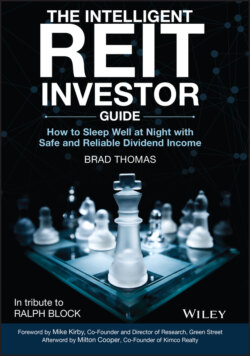Читать книгу The Intelligent REIT Investor Guide - Brad Thomas - Страница 22
Preferred Stocks
ОглавлениеMany investors seeking higher yields have become interested in preferred stocks, including those issued by REITs. (That's one reason we included an entire segment on preferred shares later in the book.) Unlike bonds, these shares aren't guaranteed by the company in question to repay a specific amount at a specified date. And in the event of liquidation or bankruptcy, preferred shareholders’ rights are subordinated to those of the corporation's creditors.
With that said, they do have seniority over common shareholders. Plus, most preferred stocks specify that common dividends cannot be paid unless preferred dividends are current.
Credit agencies treat preferred stocks as equity when everything is said and done. As for the companies themselves, they regard them as permanent capital that doesn't dilute common‐stock‐related interests, which sounds about right.
Most preferred dividend rates are set when they're first issued and remain that way for as long as the shares are outstanding. And since they have little if any appreciation potential on their own, their holders don't participate in the company's earnings growth. It's also important to know that the issuer can typically redeem them after a period of time – usually five years after issuance – at their original price. So if interest rates fall, the shareholder may be deprived of a good, high‐yielding investment.
Then there's liquidity. It can be difficult to buy or sell large amounts of preferreds at a time. And there's often a significant spread between the bid and ask prices. Additionally, in admittedly abnormal cases where the issuer is acquired or goes private, preferred shareholders can be negatively affected by lack of disclosure concerning company information or by higher debt leverage at the newly private company.
These assets still appeal to many though because of their higher dividend yields compared to most common shares and corporate bonds (assuming comparable credit quality). This, alongside their payouts having priority over common stocks, makes them especially attractive during uncertain times, such as the 2020 pandemic.
